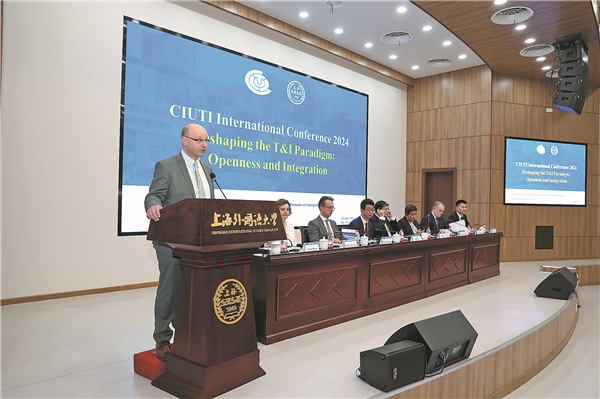Forum: AI will enhance but not replace human interpreters


Ian Phillips, director of the news and media division of the Department of Global Communications at the United Nations, recently stated at a conference, "I would encourage people to continue to seek excellence in their fields, but to use machine technology and innovation to enhance what they do.
"Maybe over time, humans and machines will come together in any industry that allows each to do a little bit of the work, but I don't think machines will replace humans altogether," he said in an interview during the conference themed "Reshaping the Translation and Interpretation Paradigm: Openness and Integration".
The 2024 CIUTI International Conference was held at Shanghai International Studies University from Tuesday to Friday. CIUTI is a Belgium-based international association of university institutes with translation and interpretation programs.
Specific topics of the conference include graduate employment, translation education in the context of AI, translation education and online platforms, and translation studies and intercultural communication.
Artificial intelligence should be viewed as an opportunity rather than a threat to existing jobs, including translation and interpretation posts, Phillips said.
The increasingly non-negligible AI technology is here to enhance people's daily work, complement what they do, and perform some functions that allow individuals to focus more in-depth on other things instead of removing humans from the production process, he says.
Phillips says that in their everyday work, they use AI tools to look at UN reports to try to distill them into languages that the general public may better understand. Their view is to experiment with it in a cautious, slow approach. And there is always a human editor to check it and verify it.
"There is nothing quite as good as a human interpreter who is highly trained. Machines don't pick up on body language. There are some subtle nuances that machines don't pick up on. It allows for something machines will never be able to replicate," he says.
Peter Dawkins, chief of the Web services section of the Department of Global Communications at the UN, echoes that while tools and technologies are speculated to be more applicable in less formal circumstances, such as using translation devices when traveling, machines will not take over anytime soon in the highly professional need for interpretation.
"Such scenarios include interpretation with government officials or important businesspeople where there is much more subtlety in tone of voice or body language, and also in high stakes with finances, economics, international diplomacy, peace and security," he says.
Having tried various tools to do a live transcription, which follows a meeting and puts the language into text, they have never found one tool that is 100 percent accurate, says Dawkins.
Such situations are easy to understand particularly with English, as people from different backgrounds may have been trained with different ways of speaking.
"Machines make obvious transcription errors, especially when it's a non-native English speaker. Such mistakes could lead to devastating communication misunderstandings," says Dawkins.
Li Zhengren, executive dean of the Graduate Institute of Interpretation and Translation at Shanghai International Studies University, says that when facing new situations, particularly those posed by AI technology, a good translator and interpreter at present and in the future must be someone who can make full use of machines to reduce work intensity and increase efficiency, correct and polish machine translation, and be at a high level in both Chinese and English.
"Excellent translation talent will continue to play an important role as globalization increases and the country further deepens reform and opening-up," says Li.
He points out that machine translation has a fatal weakness — its quality cannot be guaranteed. The basis of machine learning is big data and massive open content is part of it, resulting in average quality.
"For example, if there is a mistake in content with a relatively high number of clicks by online users, the content will be more represented in the content for big data. Also, there can be uncorrected mistakes and outdated expressions. They cannot be erased," says Li.
Issues regarding legal liability and confidentiality are among other reasons that make human translators more reliable, he says.
"However, AI shouldn't be seen as an enemy. For the progress and development of society as a whole, it is a great thing that general, repetitive and plain conversations no longer need to be translated by costly human resources," Li says.



































